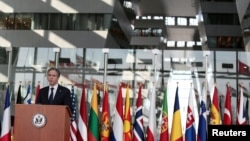The North Atlantic Treaty Organization, or NATO, is a defensive alliance made up of now 30 countries, covering almost a billion people on a voluntary basis. Member states “come together around shared values of democracy, freedom, openness, and a rules-based international order to make sure that countries can move forward together peacefully,” said Secretary of State Antony Blinken at NATO Headquarters in Brussels.
The United States’ commitment to NATO remains strong. “We have a very broad agenda to make sure that this alliance is as effective over the next 75 years. . .as it’s been in its first 75 years,” emphasized Secretary Blinken:
“We’re determined to revitalize our alliances, to revitalize our partnerships, starting with NATO. . . .When we look at virtually all of the challenges that we face as a country and that are actually going to potentially affect the lives of our citizens, not a single one of them can be effectively dealt with by any one country acting alone, even the United States with all of the resources that we have. We have a profound interest, whether it is tackling some of the new challenges like climate, in the cyber realm, the rise of autocratic states and the challenges they pose – we have a profound interest in doing it together, doing it collectively, relying on collective security. And that’s what NATO is all about.
The mission now is to make sure that “we’re bringing NATO fully into this moment to meet the challenges of today, and that is exactly what the 2030 agenda is about,” said Secretary Blinken. “And we look very much forward to working on that with [NATO] Secretary General [Jens] Stoltenberg and with all of our partners here.”














